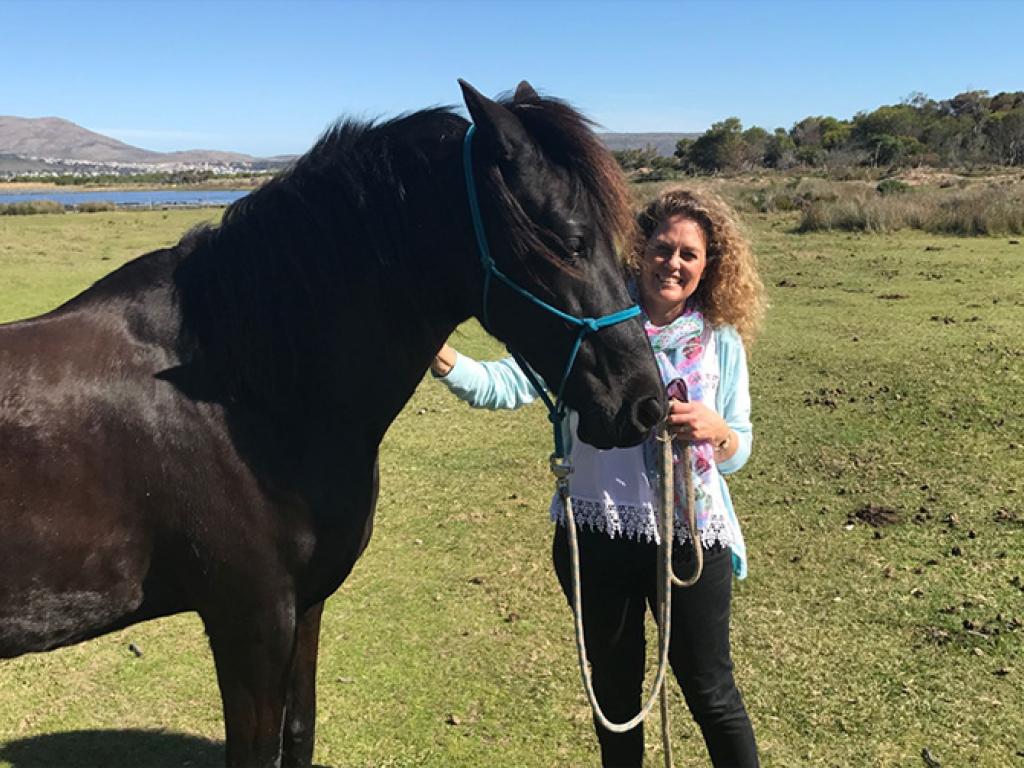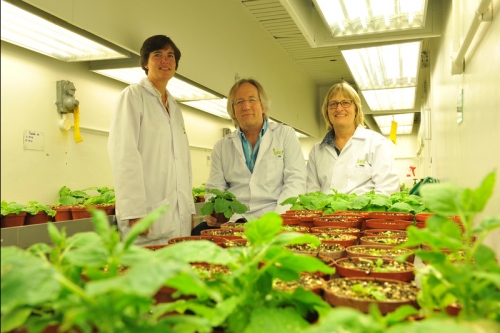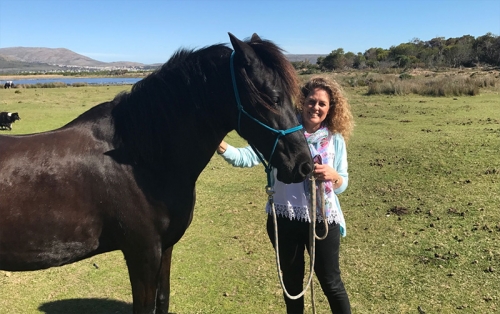New hope in fight against African Horse Sickness


BRU research group leaders in the greenhouse. They are (from left) Dr Ann Meyers, Prof Ed Rybicki and Assoc Prof Inga Hitzeroth.
Researchers at the University of Cape Town’s (UCT) Biopharming Research Unit (BRU)â in the Department of Molecular and Cell Biology have created a promising new vaccine candidate to help prevent the devastating effects of African Horse Sickness (AHS) – and they’re producing it in tobacco plants.
It’s extremely immunogenic, and also produces neutralising antibodies when administered to healthy horses, said BRU director Professor Ed Rybicki. This means that while the vaccine works really well in initial tests, it must be tested against an actual outbreak of AHS before it can be sold.
The results were published recently in the respected Veterinary Research journal.
The need for an effective AHS vaccine is pressing. The disease is a devastating one, particularly in Africa, with up to 90% of infected horses dying in some outbreaks.
The current commercial vaccine is what is known as a live-attenuated vaccine, and while it remains effective, it carries some risks, according to Professor Alan Guthrie, director of the Equine Research Centre at the University of Pretoria and a former collaborator on the BRU project.
Live vaccines, he cautioned, can and occasionally do cause outbreaks of their own.
“There are two problems with a live-attenuated virus vaccine – reassortment of the genome and reversion to virulence,” he explained, adding that this can lead to outbreaks, as happened in the Western Cape in three different AHS outbreaks during the past 15 years, in 2004, 2011 and 2014.
This is why the currently available vaccine is not used in other parts of the world, Guthrie said, warning that this is a looming threat as a changing climate allows the midge that carries the virus to spread to new parts of Europe and the United Kingdom.
“Very promising”
Sue Dennis, PhD candidate and lead author on the study, said the BRU’s plant-produced vaccine does not carry any of these risks, which makes it suitable for use worldwide.

Sue Dennis, PhD candidate and lead author on the study, says the UCT version of an AHS vaccine carries none of the risks of the currently available vaccine.
“We’ve used tobacco plants to produce four different virus proteins that automatically assemble to form a virus-like particle (VLP). It looks the same as the virus, just without any genetic material, so it cannot replicate or infect horses with the disease,” she said.
This VLP is the vaccine which, when injected into an animal, prompts the immune system to produce antibodies to the virus that will fend off the real thing, so protecting the animal from disease.
“When we tested the plant-produced vaccine in healthy horses, we saw an immune response at the same level as the live vaccine.”
Dennis said that initial results look very promising, but that there is more work to be done.
“When we tested the plant-produced vaccine in healthy horses, we saw an immune response at the same level as the live vaccine,” she revealed.
When first testing vaccines in live animals, the most important thing is to show that the animal’s health is not affected, and that the immune system produces neutralising antibodies – the best indication that the vaccine will work against the live virus.
On both counts, the BRU study has been a success.
“The presence of neutralising antibodies is a strong indication that horses will be protected from the virus. But to confirm that the vaccine offers complete protection, we need what’s called a live challenge,” Dennis explained.
In addition, the VLPs produced by Dennis and her colleagues represent just one strain of the AHS virus (AHSV); they are currently working on producing vaccines against the other strains.
Vaccine from tobacco plant
This success builds on more than 10 years of work at the BRU producing VLPs and other proteins in tobacco plants. In particular, years of work on bluetongue virus, which is related to the AHS virus, has contributed to this breakthrough.
The next step is to test the protective power of the vaccine in horses against a challenge with live, virulent AHSV (the so-called live challenge) to see whether this promising vaccine candidate can stand up against the live virus.
If this does as well as the current live-attenuated vaccine, BRU researchers believe they will be well on their way to a new global AHS vaccine.
This research was funded in part by the Technology Innovation Agency, and related intellectual property (IP) has been protected through UCT’s Department of Research, Contracts and Innovation, which receives a rebate from the Department of Science and Technology (DST) National IP Management Office (NIPMO) to support patenting.
